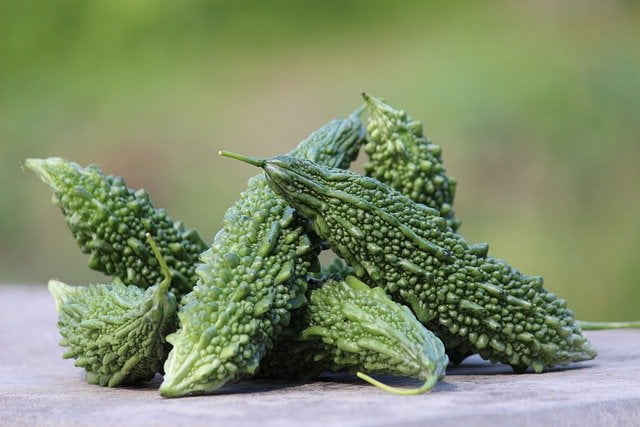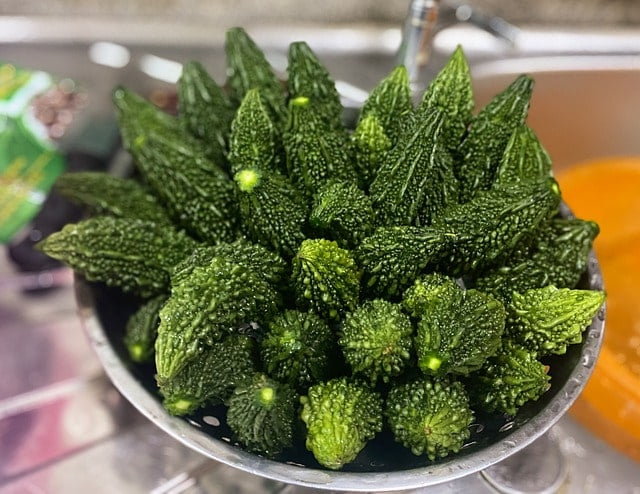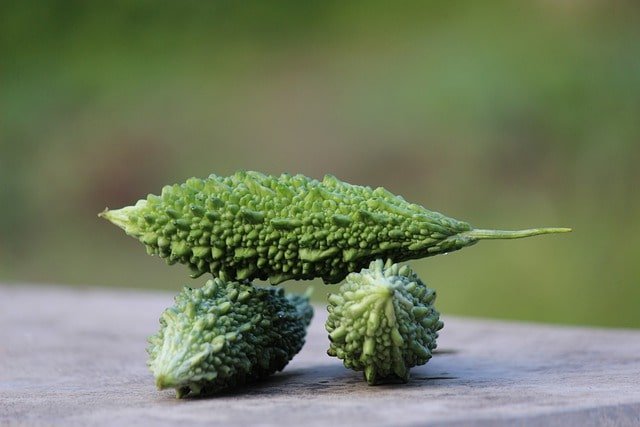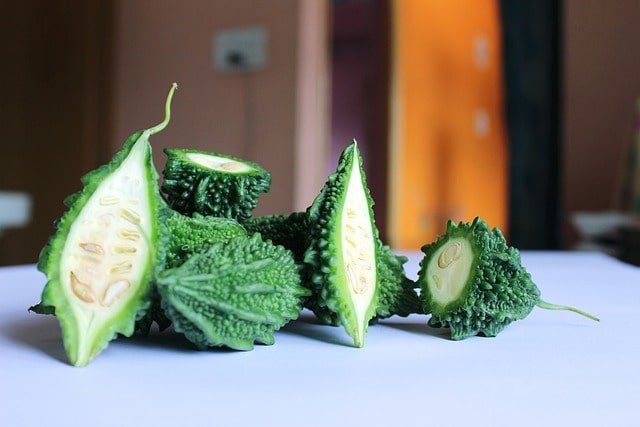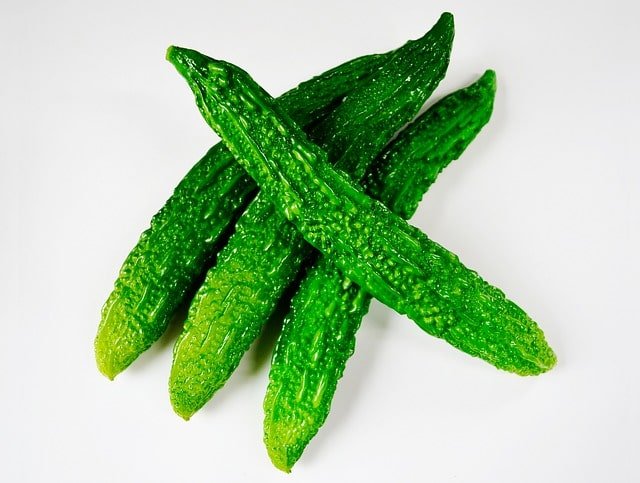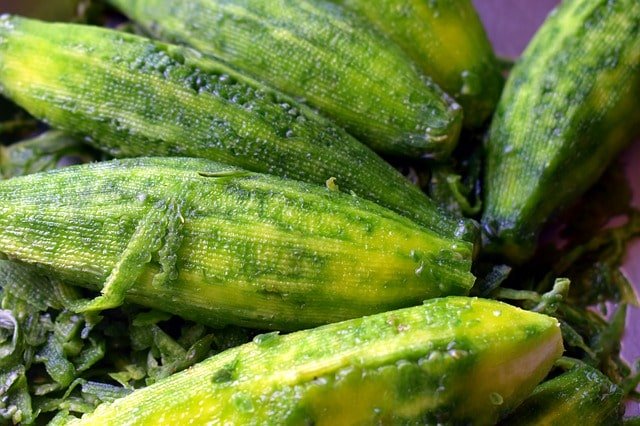What is Bitter Gourd (or Bitter Melon)?
Bitter gourd (or bitter melon) is a tropical or subtropical vine belonging to the Cucurbitaceae family. It is a vegetable with green skin which contains white to translucent flesh.
The vegetable majorly grows in parts of East Africa, the Caribbean, South America, and Asia.
The vegetable Bitter gourd got its name because of its taste. That is the name itself gives a hint about its taste and vice versa.
As the fruit ripens up, its taste gets bitterer. It has been awarded many other names such as bitter squash, bitter apple, balsam pear, and bitter cucumber. Its scientific name is Momordica charantia.
There are various varieties of bitter gourd, but Chinese bitter gourd and Indian bitter gourd are the two most common.
The Chinese variety is long and pale green, with blunt ends and smoother skin. On the other hand, the Indian variety has narrow and pointed ends with a rough texture and angled ridges all over its surface.
The differences between both these varieties are mainly visual, but both offer similar flavor and health benefits.
Bitter gourd is best known for its taste, but if we ignore the taste, it has many nutritional and health benefits.
Let’s dig a little deeper to understand the nutrition, uses, and health benefits of bitter gourd (bitter melon).
What are the Different Names of Bitter Gourd (Bitter Melon)?
The bitter melon is also called with different names by people worldwide and in different parts of India. It also comes in numerous varieties. One can easily visualize the difference in their looks, but they all have a similar flavor as well as health benefits. Let’s learn different names for bitter melon.
- Ku-Gua in China
- Ampalaya in the Philippines
- Goya in Okinawa
- Nigauri in Japan
- Karela in India
- Margose or Margoze in Mauritius
- Caraille or Carilley in Trinidad or Tobago
- Parya in Ilokano
- Mara in Thailand
- Korola in Bangladesh
- Karela in Pakistan
- Sinhala or Karavila in Sri Lanka
- Pare in Indonesia
- Tite Karela in Nepal
- Karate in Goa
- Karle in Maharashtra
- Paagarkaai or Pavakai in Tamilnadu
- Hāgalakāyi in Karnataka and many more
What is the Nutrition Facts (Value) of Bitter Gourd (Bitter Melon)?
Here, we will understand the nutritional value of Bitter Gourd (Bitter Melon) per 100 grams.
| Nutrition (Facts) Value of Bitter Gourd (Bitter Melon) per 100 gram, boiled, drained (1) | |
| Energy | 19 Kcal |
| Water | 93.95 g |
| Carbohydrates | 4.32 g |
| Sugars | 1.95 g |
| Dietary fiber | 2.0 g |
| Protein | 0.84 g |
| Fat | 0.18 g |
| Minerals | |
| Sodium | 6 mg |
| Calcium | 9 mg |
| Potassium | 319 mg |
| Iron | 0.38 mg |
| Magnesium | 16 mg |
| Phosphorus | 36 mg |
| Zinc | 0.77 mg |
| Manganese | 0.086 mg |
| Vitamins | |
| Vitamin A | 6 mcg |
| Vitamin B1 (Thiamine) | 0.051 mg |
| Vitamin B2 (Riboflavin) | 0.053 mg |
| Vitamin B3 (Niacin) | 0.28 mg |
| Vitamin B5 (Pantothenic acid) | 0.193 mg |
| Folate | 51 mcg |
| Vitamin C | 33 mg |
| Vitamin E | 0.14 mg |
| Vitamin K | 4.8 mcg |
What are the Uses and Health Benefits of Bitter Gourd (Bitter Melon)?
Below in this article, I am explaining to you the 11 uses and health benefits of bitter gourd (bitter melon or karela):
1) Benefits of Bitter Gourd (Bitter Melon) for Gut Health
Bitter melon consumption helps to promote gut health. This vegetable is helpful in treating intestinal disorders. Furthermore, its consumption is beneficial for stomach aches, constipation, and Irritable Bowel Syndrome (IBS).
Doctors recommend including Bitter Melon in the diet in order to keep a healthy digestive system.
The high fiber content, natural laxative property, and antioxidants present in it are beneficial for maintaining digestive health.
2) Benefits of Bitter Gourd (Karela) In Diabetes
Bitter Melon has anti-diabetic properties and insulin-like properties; therefore it is very effective for lowering the effects of blood glucose. People with diabetic-related conditions are highly recommended to include bitter gourd (karela) in their diet.
In recent years, several studies have established this vegetable’s role in blood sugar control.
A 3-month study conducted on 24 adults with diabetes has shown that administering 2,000 mg of bitter gourd daily decreased blood sugar and hemoglobin A1c (a test which is used to measure blood sugar levels over three months) (2).
Another study which was conducted on 40 newly diagnosed type 2 diabetes patients found that intake of 2,000 mg per day of bitter melon for 4 weeks led to a modest hypoglycemic effect (reduction in blood sugar levels) and significantly reduced fructosamine (another marker of long-term blood sugar control) levels from baseline (3).
This vegetable is thought to improve the way that sugar is used in your tissues and promote the secretion of insulin, which is responsible for regulating blood sugar levels.
Bitter melon boosts glucose use in the muscles and inhibits its uptake in the intestines. Its extracts guard the pancreatic cells against pro-inflammatory cells and compounds (4).
The seeds, fruit pulp, and whole plant extracts of bitter melon are known to have a hypoglycemic effect. The compounds present in Bitter Melon such as charanti, vicine, and polypeptide-p work alone or together to lower the levels of blood sugar.
Thus, diabetic patients are advised to take bitter gourd juice daily morning with an empty stomach.
3) Bitter Gourd (Karela) Acts as an Immunity Booster
Bitter Gourd contains rich antioxidant properties. Antioxidants are necessary to multiply the white blood cells (WBCs) and immune cells.
Persons with some allergic issues may also feel better by including bitter melon (karela) in their diet.
4) Bitter Melon (Karela) Cleanses the Liver and Purifies Blood
The consumption of Bitter Gourd purifies the blood. Moreover, it helps in cleansing all the intoxicating substances from the liver and purifies the bowel.
Pre-clinical studies conducted on rats revealed the liver-protective properties of bitter gourd. Obesity, high-fat diets, alcohol, and diabetes lead to the development of a fatty liver (5), (6).
Consumption of bitter gourd can control oxidative damage as it can block the fat accumulation and lipid peroxidation mechanism, which slows down cell death caused by inflammation in the liver (5)
Bitter melon (karela) also increases your body’s antioxidant system and its extracts can stop the liver damage caused by chronic alcohol consumption (6).
The intake of bitter melon (karela) helps in improving the functions of the bladder and healing several liver issues.
5) Bitter Gourd (Karela) is Helpful to Prevent Cancer
The substances mainly responsible for cancer in the body are known as free radicals. It is important to keep the body free from such radicals.
The components such as vitamin A, lignans, and lycopene present in bitter gourd are useful for the body to fight against them.
One in-vitro study has shown that bitter gourd extract was effective at killing cancer cells of the lung, nasopharynx, stomach, and colon (7).
The seed oil of bitter melon has biologically active fatty acids that interfere with the proliferation of liver and breast cancer cell lines. The skin extract and whole fruit of bitter melon also show high efficacy in fighting colon cancer (8).
In mouse studies, the bitter melon extract was found to be selectively toxic to prostate cancer cells. It also controls the pro and anti-inflammatory protein levels in the affected tissue. It slows down the overall growth and migration of nose and pharynx, cervical, and blood cancers as well (8).
6) Bitter Melon (Karela) Helps to Lower Cholesterol Levels
High cholesterol levels lead to a high risk of cardiovascular diseases. There are studies in support of the fact that Bitter gourd helps in reducing bad cholesterol levels and regulating good cholesterol.
Numerous studies conducted on animals have found that bitter gourd may lower cholesterol levels to support overall heart health.
One such study conducted on rats on a high-cholesterol diet showed that administering bitter gourd extract led to noteworthy decreases in total cholesterol, LDL cholesterol, and triglycerides levels.
Another study found that giving rats a bitter gourd extract significantly decreased cholesterol levels compared to a placebo. Its higher doses showed the greatest decrease (9).
Further studies are required to conclude whether these same effects apply to humans who consume the gourd as part of their balanced diet.
Also, it contains all the components such as calcium, potassium, etc., which have a positive impact on the heart.
7) Bitter Gourd (Karela) Benefits for Weight Loss
Bitter gourd helps in reducing extra pounds and thereby boosting the overall metabolism. Its nutrient-rich properties make it one of the best foods for weight loss.
Being low in calories and high in fiber, bitter gourd makes a wonderful addition to a weight loss diet. It contains 2.0 grams of fiber per 100 grams of serving (1).
As fiber passes very slowly through your digestive tract, helping to keep you full for longer and reduces hunger and appetite (10).
Thus, swapping higher-calorie foods with bitter melon could help raise your fiber intake and decrease calories to help in weight loss.
Some studies also show that this vegetable has beneficial effects on fat burning and weight loss.
One study conducted in Taiwan has shown that consuming a capsule containing 4.8 grams of wild bitter gourd powder each day led to a noteworthy decrease in belly fat. Adults participating in the study had lost an average of 0.5 inches from their waist circumference after seven weeks (11).
Bitter gourd also works on lipid metabolism along with the metabolism of glucose. Studies have confirmed that it can reduce the accumulation of fat, hence exerting an anti-obesity effect (12).
Another study shows that bitter gourd seed oil may deplete the fat reserves in your body by selectively killing fat storage cells (called adipocytes). This is due to the reason that it contains active molecules like alkaloids, triterpenoid glycosides, carotenoids, flavonoids, fatty acids, and polyphenols that prevent the inflammation of adipose tissue, which is usually linked to metabolic disorder (12).
Thus, to reduce obesity, you can take the bitter melon in the form of raw juice.
8) Bitter Melon (Karela) Benefits For Hair
Bitter melon is the best food that can be used for healthy and shiny hairs. The components in this vegetable (karela) such as zinc, vitamin C, and protein help to make your hair stronger and healthier.
The application of bitter melon juice regularly to your scalp helps to decrease hair fall & greying of hair, treat rough hair & split ends, remove dandruff, and combat itchiness.
You can apply bitter melon juice directly to stop hair loss or mix it with some curd and massage on your scalp and hair for conditioning.
For dandruff treatment, you can make a hair mask with bitter melon juice, a tablespoon of lime juice, and cumin seed paste. Leave this mask for 30 minutes and rinse.
9) Bitter Melon (Karela) Benefits for Eyes Health
Doctors prescribe that the use of Bitter Melon helps to treat eye-related issues.
It is rich in vitamin A and thus prevents cataracts and helps in treating poor eyesight. Moreover, dark circles can also be treated with the help of Bitter gourd.
10) Bitter Gourd (Karela) Benefits For Skin
Vitamin C is an essential factor for beautifying the skin, keeping it wrinkle-free, and preventing premature aging. Bitter gourd (bitter melon) contains high amounts of vitamin C which helps in the smoothening and elasticity of the skin.
This vegetable has excellent anti-inflammatory properties and can treat various skin conditions like rashes, eczema, psoriasis, sores, and wounds. The native tribes of Asia and Africa use a paste made from the bitter melon plant to apply topically on injuries and blisters.
Moreover, it is also useful in protecting the skin from harmful UV rays, treating eczema and psoriasis, and reducing acne and blemishes from the skin.
Studies conducted on rabbits proved the effect of skin creams enriched with extracts of bitter melon on wounds. Those rabbits, who received this cream treatment experienced improved and accelerated wound healing (13).
The peel of bitter melon has the significant potential to prevent skin cancers. Cancer studies conducted on mice revealed that bitter melon extracts had improved the quality of life and life span of mice (8).
11) Bitter Gourd May Obstructs Helminthic Infections
Helminthic infections are diseases that are caused by parasitic worms such as nematodes, cestodes, and trematodes, that affect humans and livestock. Extracts of various parts of bitter melon (bitter gourd) have shown anthelmintic activity against adult earthworms (14).
Recent studies claim that bitter melon phytochemicals like alkaloids, saponins, flavonoids, oligoglycosides, and tannins are most effective in killing the nematodes. These can paralyze them and disrupt their nervous and vascular system (14).
Bitter gourd (karela) can reduce the worm load in your body and can prevent the worsening of such helminthic infections (14).
Its juice is an age-old home remedy that is used by many to get rid of intestinal worms.
What are the Side Effects of Bitter Gourd (Bitter Melon)?
The consumption of bitter melon in adequate quantities is always healthy for the body and rarely has any side effects.
But taking supplements of it or consuming it in high amounts might become the reason for some bad impacts on the body. It may lead to stomach pain, vomiting, diarrhea, etc.
Consumption of bitter gourd for a maximum of 4 months is safe. But there is no study or data to show whether it is safe for long-term use or not.
It’s also not recommended for pregnant women because its long-term effects on health have not been comprehensively studied.
If you’re taking any anti-diabetic medication, then you should consult with your doctor before consuming this vegetable due to its impact on blood sugar.
Moreover, when it is applied to the skin, it might cause some rash depending upon the skin type.
Precautions and Warnings for the Consumption of Bitter Melon
Below are some precautions that are to be taken for the consumption of Bitter melon (karela):
- If you are about to undergo any surgery, prohibit the use of bitter melon at least before 2 weeks of surgery. It may cause some interference with the control of blood sugar both during and after the surgery.
- There are studies that show that the seeds of bitter gourd might become the reason for anemia in people having G6PD deficiency.
- During pregnancy, the consumption of Bitter melon might not be safe. The pregnant woman may get badly impacted by the chemicals present in the bitter melon (karela).
- To prevent any complications, avoid using bitter gourd (bitter melon) during breastfeeding, due to the unavailability of proper information on whether it is safe or not.
How to Use and Eat Bitter Gourd (Bitter Melon or Karela)?
Though, the Bitter Gourd is often disliked by the majority of people. But it can be used in many ways, which I am listing below.
- Delicious tikkis can be prepared with Bitter gourd or karelas by mixing them with several other veggies, low-fat paneer, and peas.
- Karela juice can be made along with lemon and salt. It has many health benefits. Also, it is simple to prepare.
- This vegetable is also used in Indian kitchens to prepare healthy and delicious Theplas.
- Bitter melon is also used to make simple or stuffed sabzi as well as curry.
- Other recipe uses of Bitter Gourd include Sukhi karela sabzi, onion, and karela sabzi, crispy karela, karela, and capsicum sabzi, karela Mathias, karela kadhi, stuffed karelas in makhani gravy, and many more.
- It is being used in various south Indian dishes such as thoran / thuvaran, Thoran / thuvaran, theeyal, pachadi, pagarkai pitla, kattu pagarkkai, etc.
- People especially Nepalis and North Indians use Bitter Melon to make pickles.
- Stuffed with vegetables and ground meat, it can be served with a black bean sauce.
- By combining seedless bitter gourd with your choice of dressing, and can be garnished for a savory salad.
- There is wide use of Bitter Gourd in different herbal medicinal systems of Asia and Africa.
- Bitter melon is also effectively used for curing several health issues and diseases.
Conclusion
Apart from its bitter taste, bitter gourd (bitter melon) is rich in various important nutrients and is also linked to numerous health benefits, including improved cholesterol levels and blood sugar control.
There are several ways through which you can prepare bitter gourd (karela) and eat. But, always remember to involve an adequate amount of it in the diet. Its consumption may lead to some allergies or side effects in some people.
It can be taken via the mouth or can be applied to the skin. If you are having certain health conditions, consult your doctor or professional before including this vegetable in your diet.
In moderate amounts, bitter gourd makes for a nutritious, flavorful, and easy addition to a healthy and balanced diet.
References:
1) U.S. DEPARTMENT OF AGRICULTURE, FoodData Central
https://ndb.nal.usda.gov/ndb/search/list
2) Momordica charantia Administration Improves Insulin Secretion in Type 2 Diabetes Mellitus
https://www.liebertpub.com/doi/10.1089/jmf.2017.0114
3) Hypoglycemic effect of bitter melon compared with metformin in newly diagnosed type 2 diabetes patients
https://www.sciencedirect.com/science/article/abs/pii/S0378874110009219?via%3Dihub
4) Antidiabetic effects of Momordica charantia (bitter melon) and its medicinal potency
https://www.ncbi.nlm.nih.gov/labs/pmc/articles/PMC4027280/
5) Bitter gourd inhibits the development of obesity-associated fatty liver in C57BL/6 mice fed a high-fat diet
https://pubmed.ncbi.nlm.nih.gov/24523491/
6) Wild bitter gourd protects against alcoholic fatty liver in mice by attenuating oxidative stress and inflammatory responses
https://pubmed.ncbi.nlm.nih.gov/24664243/
7) Momordica charantia Extract Induces Apoptosis in Human Cancer Cells through Caspase- and Mitochondria-Dependent Pathways
https://www.ncbi.nlm.nih.gov/labs/pmc/articles/PMC3471438/
8) Bitter melon: a panacea for inflammation and cancer
https://www.ncbi.nlm.nih.gov/labs/pmc/articles/PMC5276711/
9) Effect of methanolic seed extract of Momordica charantia on body weight and serum cholesterol level of male Sprague-Dawley rats.
https://www.scinapse.io/papers/49515921
10) Ratios of soluble and insoluble dietary fibers on satiety and energy intake in overweight pre- and postmenopausal women1
https://www.ncbi.nlm.nih.gov/labs/pmc/articles/PMC5389022/
11) Wild bitter gourd improves metabolic syndrome: A preliminary dietary supplementation trial
https://www.ncbi.nlm.nih.gov/labs/pmc/articles/PMC3311063/
12) Momordica charantia (Bitter Melon) Reduces Obesity-Associated Macrophage and Mast Cell Infiltration as well as Inflammatory Cytokine Expression in Adipose Tissues
https://www.ncbi.nlm.nih.gov/labs/pmc/articles/PMC3866167/
13) The beneficial effects of Momordica charantia (bitter gourd) on wound healing of rabbit skin
https://pubmed.ncbi.nlm.nih.gov/22812507/
14) An Update Review on the Anthelmintic Activity of Bitter Gourd, Momordica charantia
https://www.ncbi.nlm.nih.gov/labs/pmc/articles/PMC5414453/
Disclaimer: This article is intended for informational purposes only. Any information associated with this article should not be considered a substitute for prescriptions suggested by local health care professionals.
Recommended Articles:
1) Beetroot (Beets): Uses, Health Benefits, & Side Effects
2) Turnips (Shalgam): Uses, Health Benefits, & Side Effects
3) Broccoli: Uses, Health Benefits, Nutrition, Side Effects
4) Carrots: Uses, Health Benefits, Nutrition, & Side Effects
5) Radish: Uses, Health Benefits, Nutrition, & Side Effects
